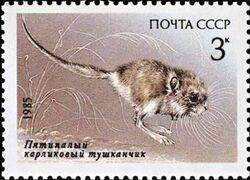Biology:Five-toed pygmy jerboa
| Five-toed pygmy jerboa | |
|---|---|

| |
| Scientific classification | |
| Domain: | Eukaryota |
| Kingdom: | Animalia |
| Phylum: | Chordata |
| Class: | Mammalia |
| Order: | Rodentia |
| Family: | Dipodidae |
| Subfamily: | Cardiocraniinae |
| Tribe: | Cardiocraniini Vinogradov, 1925 |
| Genus: | Cardiocranius Satunin, 1903 |
| Species: | C. paradoxus
|
| Binomial name | |
| Cardiocranius paradoxus Satunin, 1903
| |
The five-toed pygmy jerboa (Cardiocranius paradoxus) is a species of rodent in the family Dipodidae. It is monotypic within the genus Cardiocranius.[2] It is found in China , Kazakhstan, and Mongolia.
Its natural habitat is temperate desert. This species is not well known and its population and conservation status are unresolved.
Cardiocranius paradoxus has adapted to its desert environment by burrowing underground to prevent overheating and promote survival. They use their burrows for food storage and shelter, and, in cold winters, they hibernate in burrows to conserve energy. Burrowing accounts for the five-toed pygmy jerboa's tendency to be nocturnal, as they prefer to forage for food during the night when conditions are less severe.[3]
References
- Notes
- ↑ Clayton, E. (2016). "Cardiocranius paradoxus". IUCN Red List of Threatened Species 2016: e.T3858A22202937. doi:10.2305/IUCN.UK.2016-1.RLTS.T3858A22202937.en. https://www.iucnredlist.org/species/3858/22202937. Retrieved 12 November 2021.
- ↑ https://www.mammaldiversity.org/explore.html#genus=Cardiocranius&species=paradoxus&id=1001976
- ↑ Mohammadi, Saeed; Kaboli, Mohammad; Karami, Mahmoud; Naderi, Gholamreza (2010). "Burrow systems of Iranian jerboa". Acta Zoológica Mexicana 26 (2): 457–463. https://www.scielo.org.mx/scielo.php?script=sci_arttext&pid=S0065-17372010000200010.
- Sources
- Holden, M.E.; Musser, G.G. (2005). "Family Dipodidae". in Wilson, D.E.; Reeder, D.M. Mammal Species of the World: A Taxonomic and Geographic Reference (3rd ed.). Johns Hopkins University Press. pp. 871–893. ISBN 978-0-8018-8221-0. OCLC 62265494. http://www.departments.bucknell.edu/biology/resources/msw3/browse.asp?id=12900003.
Wikidata ☰ Q1482249 entry
 |


